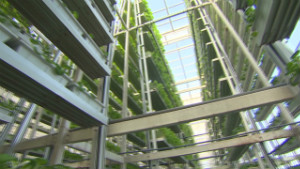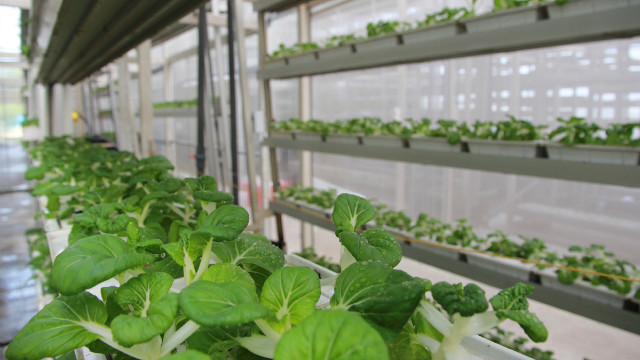STORY HIGHLIGHTS
- First commercially operating vertical farm opened in Singapore in October
- Over 100 towers producing vegetables for local consumers
- Farmer and inventor of system believes it can help food security and cut down food miles
(CNN) -- Less than 20 miles from Singapore's skyscrapers is a completely different set of high-rise towers.
Much smaller in scale but with a big ambition, over 100 nine-meter tall towers at Sky Greens vertical farm offer a new vision of urban sustainability.
Green vegetables like bak choi and Chinese cabbage are grown, stacked in greenhouses, and sold at local supermarkets.
The idea of vertical farming goes back to the 1950s, but Jack Ng, farm owner and inventor of the system in place at Sky Greens, has patented elements of his design.

The plants don't get overstressed under the sun and at the same time they can get nutrients in the water equally.
Jack Ng, Sky Greens
Jack Ng, Sky Greens
Slowly rotating on water-powered, aluminum A-frames, the vegetables pass through a trough of water every eight hours. The water powering the frames is recycled and filtered before returning to the plants. All organic waste on the farm is composted and reused.
"The plants don't get overstressed under the sun... at the same time they can get nutrients in the water equally," says Ng.
According to Ng the energy needed to power one A-frame is the equivalent of illuminating just one 60-watt light bulb.
The farm's first prototype was built in 2009 and since October this year the fully operating farm has been supplying one of city's supermarkets with weekly deliveries of its greens. The Sky Greens produce costs around 40% more than an imported Chinese equivalent.
Singapore only produces around 7% of the vegetables it consumes. While Ng believes that an expansion of its system of vertical farming could increase that to 50%, food security is less of an immediate benefit than the reduction of "food miles."
The small amount of energy and water needed to grow the vegetables, and the close proximity to the consumer, means that C02 emitted in production and transportation is kept to a minimum.
Sky Greens venture is supported by the Singaporean government and has another advantage over other urban farms around the world: abundant natural heating and light. Singapore has year-round temperatures of around 86 degrees Fahrenheit (30 degrees Celsius) and the farm is set in an open area designated by the government as an agro-technology park, miles away from the shadow of city skyscrapers.
American ecologist Dickson Despommier has been a chief advocate for vertical farms for over decade who has imagined bigger and bolder ideas than Sky Greens' farm. One concept is a 21-story transparent skyscraper dedicated to growing food and could be built in the heart of a city like New York City.
A problem that has prevented many vertical farm ideas from taking off in true urban areas is getting enough light and water. LED lighting has been identified as one low-energy solution to part of that problem, but is still being developed.
Yet Ng believes his system could be adopted around the world, especially in Southeast Asia. There are plans for the current site to expand to produce up to two tons of greens a week next year and build over 2,000 towers in the next few years.
"We must reduce, reuse and recycle," says Ng. "Singapore is a land scarce country, so if we want to produce our own food we must go (for) high property."
 Vertical farms were conceptualized in the 1950s, but Singapore's Sky Greens is the first commercial farm in the country with big ideas to expand.
Vertical farms were conceptualized in the 1950s, but Singapore's Sky Greens is the first commercial farm in the country with big ideas to expand.
0 comments:
Post a Comment